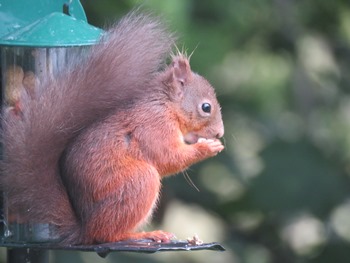The Sedbergh Red Squirrel Group

My work as a Volunteer Squirrel Ranger
By Karen HoppsI became interested in the native red squirrels when we started to get a few in our garden about 5 years ago. So, I put up several squirrel feeders and have had a great deal of enjoyment watching them – especially during mating time as they run around and around tree trunks after each other!
I have over time learnt about red squirrel behaviour, what they like to eat, favourite trees, mating cycle etc. But at the same time I have become increasingly aware of the problem of the larger grey squirrel and I decided to do anything I could to help the reds. I spoke to Penrith's Squirrel Ranger and he gave me a great deal of advice on the food greys are attracted to, where to place traps, what time of year is the best to set traps and how to dispatch them if I caught one.

It is a commitment as it takes time to set up the traps, make sure there is a food source in them (Greys eat maize) and monitor them on a daily basis.
One of my 'patches' is a wood which is a short drive to, but then a good walk through the woods to the ideal squirrel spot. Another is just up the road. I knew when I took this responsibility on that I would have to do the 'nasty deed' and dispatch the greys when I caught them. An unpleasant task, but essential if we are to keep the greys at bay and give the native red squirrel a chance. Not everything I catch is a grey. One of the most common for me are pheasants – maize must be a favourite for them too. Of course I set them free unharmed.
Another side to my volunteer roll is to give advice on feeding reds and setting up feeders in people's gardens, informing them as to why reds and greys can't live together. I want to encourage the community to care about our squirrels and come on board and help 'save our native red squirrel'. If you are willing to have a feeder, trap or just report sightings of greys, please contact us and help this endangered native.